Suchergebnisse
FTI-Initiative für die Transformation der Industrie 2025
Die Initiative des Klima- und Energiefonds soll zur Klimaneutralität der Industrie bei gleichzeitiger Standortsicherung beitragen. Für die Ausschreibung 2025 steht ein Budget von max. 60 Mio. Euro zur Verfügung.
Shaping the industrial future – making energy systems more flexible and paving the way for a circular economy
11. November 2025, 13:30 – 17:30
BMIMI, Radetzkystraße 2, 1030 Vienna, Room EA08
The future of industry is flexible, circular, and climate-neutral. But how can we successfully shape this transformation, accelerate the path toward climate neutrality and overcome practical challenges along the way? Join leading national and international experts from research and industry to explore cutting-edge research projects and exchange insights on sustainable industrial transformation.
Leuchtturm St. Veit - Klimaneutralitätsfahrplan St. Veit/Glan
St. Veit/Glan möchte ein Leuchtturm für andere österreichische Kleinstädte werden und zeigen, wie Strategien, Maßnahmen und ein notwendiger Kapazitätsaufbau für die Erreichung der Klimaneutralität bis 2040 entwickelt und umgesetzt werden können.
Climate neutrality roadmap St. Veit/Glan
St. Veit/Glan aims at advancing to a beacon for other small Austrian towns by developing strategies, measures and for building the capacity, necessary for achieving climate neutrality by 2040.
Highlights aus Forschung und Innovation im Green Energy Lab
27. November 2025
FlexRaum im Nordbahnviertel (Wohnprojekt Wien), Krakauer Straße 19, 1020 Wien
In den letzten acht Jahren sind im Rahmen der Forschungsinitiative Green Energy Lab beeindruckende Musterlösungen entstanden, die heute bereits einen wichtigen Beitrag zur Energiewende in Österreich leisten.
Österreichs Städte als innovative Vorreiter
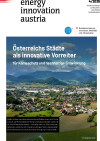
Österreichs Städte als innovative Vorreiter für Klimaschutz und nachhaltige Entwicklung
energy innovation austria
4/2025
Herausgeber: BMIMI gemeinsam mit dem Klima- und Energiefonds
Deutsch, 12 Seiten
Downloads zur Publikation
Austria’s cities as innovative leaders
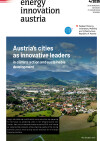
Austria’s cities as innovative leaders in climate action and sustainable development.
Herausgeber: BMIMI in cooperation with the Climate and Energy Fund
Englisch, 12 Seiten
Downloads zur Publikation
ÖGUT Umweltpreis 2025 verliehen
In der Kategorie "Klimaneutrale Stadt" gewinnt das Projekt FaciliMind von DiLT Analytics - eine KI-basierte Softwareplattform zur datenbasierten Optimierung von Energieeffizienz und Betriebskosten in Gebäuden. Das Projekt RecAL (Recycling Technologies for Aluminium) von LKR Leichtmetallkompetenzzentrum Ranshofen und AIT Austrian Institute of Technology erzielt den ersten Platz in der Kategorie "Mit Forschung & Innovation zur Kreislaufwirtschaft". Daniela Wipp und Theresa Kohl freuen sich über die Auszeichnung in der Kategorie "Frauen* in der Umwelttechnik". Das BMIMI unterstützte drei Kategorien und sponserte die Preisgelder.
Carbon Accounting Pionierstädte - THG-Bilanzierung und Monitoring klimaneutraler Städte
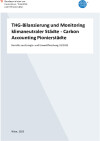
Das Bundesministerium für Innovation, Mobilität und Infrastruktur (BMIMI, vormals: BMK) hat mit der Mission "Klimaneutrale Stadt (KNS)" einen Schwerpunkt gesetzt, der das Erreichen der Klima- und Energieziele durch Forschung, Technologie und Innovation (FTI) beschleunigen wird. Im Rahmen dieser Mission begleitet und unterstützt die Umweltbundesamt GmbH Pionierstädte dabei, eine harmonisierte THG-Bilanzierung für Städte zu erstellen. Diese stellt die Basis zur gezielten Ausrichtung von Strategien und Maßnahmen, um Klimaneutralität in den Städten und Kommunen zu erreichen.
Schriftenreihe
33/2025
S. Schweiger, D. Fritz, A. Storch, H. Schreiber
Herausgeber: BMIMI
Deutsch
Downloads zur Publikation
Europäische Strategien und Gesetze
Hier finden sie einen Überblick über europäischen Strategien und Gesetze zum Thema Energie und Umwelttechnologien.
Making the Circular Economy Work
29. March 2023, 14:00-15:30
online
The speakers will go through various aspects of the circular economy, from bioenergy to industrial and urban symbioses, including local strategic planning. How can European cities and municipalities become circular? Should they develop a cross-sectoral circular economy strategy or focus on specific areas? What are the areas where the circular model can be applied?
MEIDLINGER „L“ – Partizipative und skalierbare Klimawandel- Anpassungen im Bestand an der Schnittstelle von öffentlichem und privatem Raum
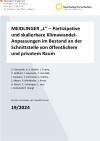
Das Projekt verfolgte einen integralen und interdisziplinären Ansatz zur Klimawandelanpassung im baulichen Bestand an der Schnittstelle von öffentlichem und privatem Raum. Es wurde ein skalier- und multiplizierbares Modell für Wien und andere Städte entwickelt.
Schriftenreihe
19/2024
S. Formanek, A. K. Briefer, L. Franta, V. Gebhart, I. Haymerle, C. Henöckl, I. Homeier, C. Kirchmair, S. Kotrba, S. Mayer, P. Minixhofer, J. Preiss, A. Rauch, C. Scharinger, L. Seel, J. Simhandl, R. Stangl
Herausgeber: BMK
Deutsch, 119 Seiten
Downloads zur Publikation
Bauen mit Regenerativen: Status Quo – Wo stehen wir jetzt?
18. Oktober 2024, 9:00 Uhr
Festsaal des ÖIAV, Eschenbachgasse 9, 1010 Wien
PlanerInnen, ImmobilienentwicklerInnen, VerwaltungsmitarbeiterInnen sowie Bauträger und Baufirmen können sich hier überzeugen, dass Bauen mit biobasierten Baustoffen nicht nur praktisch möglich, sondern technisch/wissenschaftlich abgesichert und marktreif ist.
Exkursion zur seriellen Sanierung nach Erlangen
21. – 22. November 2024
Exkursionsziel: Erlangen, Deutschland
Erleben Sie serielles Sanieren live – mit fliegenden Fassaden und der Montage vor Ort.
Staatspreis für Klimawandelanpassung: Projekt der TU Wien gewann Sonderpreis
Die Preisträger:innen des „CliA - Österreichischer Staatspreis zur Klimawandelanpassung“ wurden am 16. Oktober 2024 feierlich ausgezeichnet. Das Projekt "Open Urban Sustainability Hubs" (OPUSH) gewann den 1. Platz in der Sonderkategorie „Forschung“.
Carbon Capture in Austria: Zukünftige F&E-Schwerpunkte angesichts europäischer und weltweiter Trends
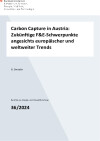
Im Projekt wurden bestehende F&E-Aktivitäten im CCUS-Bereich analysiert sowie Vorschläge für zukünftige F&E-Schwerpunkte und FTI-Bedarfe erarbeitet. Die Vorschläge enthalten Maßnahmen in der gesamten Wertschöpfungskette von der Abtrennung und dem Transport bis hin zur Nutzung oder Speicherung des CO2. Darüber hinaus wurden Empfehlungen für Marktdesign, Regulierung, Normen und Weiterentwicklung der Standards in diesem Bereich formuliert.
Schriftenreihe
36/2024
G. Simader
Herausgeber: BMK
Deutsch, 36 Seiten
Downloads zur Publikation
Netzwerk Algen 2022 - Algen in der Kreislaufwirtschaft
8. September 2022, 09:30 - 16:00 Uhr
Festsaal im BMK, Radetzkystraße 2, 1030 Wien
Die Veranstaltung bot Raum für die Vernetzung von Akteur:innen sowie Interessierten zum Thema Algen. Der Themenschwerpunkt lag auf aktuellen Entwicklungen in der Algenforschung, insbesondere auf "Algen als Lebensmittel" und "Algen in der Kreislaufwirtschaft". In einer Blitzlichtsession und einem offenen Austauschformat konnten diese Themen vertiefend diskutiert werden.
Urban cooling demand in Austria 2030/2050 (UKÖ 2030/2050)
Systematic processing of the increasing cooling demand and presentation of the geographical location of the cooling demand in Austria. The result serves as a decision-making aid for the development of climate protection measures and climate change adaptation strategies as well as an estimate of future cooling demand.
Salzburg: Klimaneutrale Stadt (Salzburg:KanS)
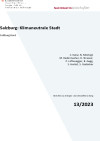
Salzburg:KanS richtet die Vision und Klimaschutzziele der Stadt Salzburg am Thema der Klimaneutralität und den Landeszielen aus, um, darauf aufbauend, eine Abschätzung der sektorspezifischen CO2 Reduktions-Beiträge bis 2030 vorzunehmen sowie Umsetzungsstrategien für die gesamte Stadt sowie die Schwerpunkte „klimaneutrale Mobilität“ und „klimaneutrales Quartier“ auszuarbeiten.
Schriftenreihe
13/2023
C. Kainz, N. Mostegl, M. Radermacher, H. Strasser, P. Lüftenegger, B. Gugg, S. Herbst, S. Gadochar
Herausgeber: BMK
Deutsch, 26 Seiten
Downloads zur Publikation
Webinar: Fostering grassland opportunities, circular business models and skills for resilient rural communities
8. June 2023, 14:00 - 16:00 CEST
Online
This webinar aims to discuss circular business models and capacity building activities including green biorefineries and funding instruments.
